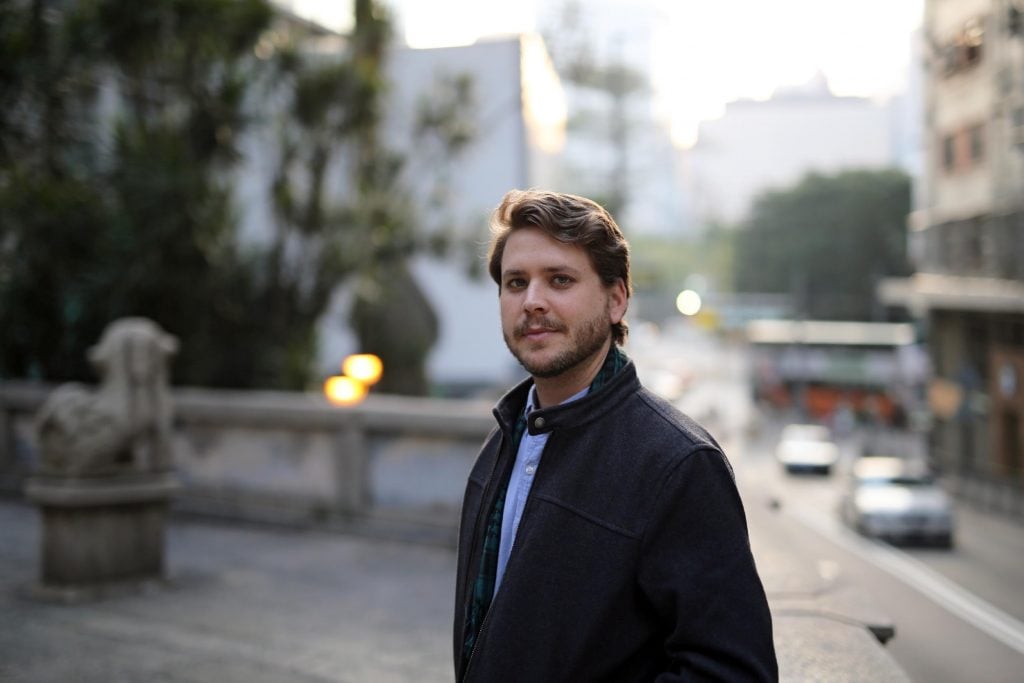
Andrew Hevia, 2015-2016, Hong Kong (Photo by Robert Scherle)
1. Can you tell us about working on Moonlight, and your involvement in making the film?
In 2007, I had just graduated from the Florida State University Film School and had moved to San Francisco. By coincidence, a group of Film School alums were in town making a micro budget feature – this turned out to be Moonlight writer-director Barry Jenkins’ debut feature, Medicine for Melancholy. Because of the alumni connection, I orbited that production and helped out whenever I could. I was an extra in the opening scene for example. That’s when I learned Barry was from Miami. It felt wrong to me that he was making a movie about San Francisco instead of Miami, so I made it my goal to change that.
Then, in 2010 or 2011, Tarell Alvin McCraney gave me a copy of his unfinished play In Moonlight Black Boys Look Blue—the story that eventually became Moonlight. I introduced him to Barry, gave Barry a copy of the play, and told him, “This might be the thing you make in Miami.” Time passed, Barry digested it and then the veteran producer Adele Romanski got wind of it, and she and Barry got Plan B and the distributor A24 involved. I had just won my Fulbright to Hong Kong and was set to leave in September, but Barry and Adele told me to delay the grant and offered me a role as co-producer. I’d been working to get Barry back to Miami for years and this was a project I cared deeply about so it was an easy and obvious yes.
As a co-producer, my job description was basically “help Barry Jenkins and Adele Romanski get the movie made.” During early pre-production, I was local to Miami, so I did a lot of the ground-level things like finding community partners and setting up casting events a few months before the rest of the team arrived. During production my job description was a lot more flexible. On any movie, especially a small one, there are so many things you can’t control that you always need someone to help deal with the unexpected. That was me. I was a fireman, and my job was to solve problems and find solutions. It was a fantastic job and it was a privilege to work with this team.
We wrapped production and I moved to Hong Kong two weeks later.
2. What are a few of the most memorable moments from your Fulbright experience? Describe a few that continue to have an impact on your current work.
A month after I arrived in Hong Kong, I climbed Lion Rock on New Year’s Eve (in the dark!) with a new group of friends and watched the fireworks over Victoria Harbor.
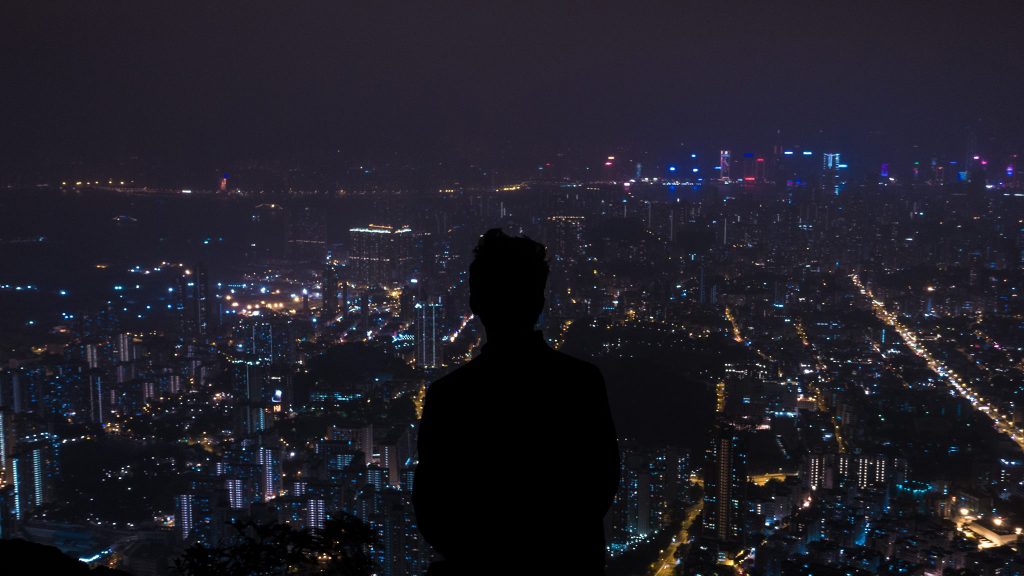
Andrew Hevia, 2015-2016, Hong Kong, watching New Year’s fireworks from the Lion Rock (Photo by Joshua Wong)
When living on a fixed income, it’s important to save money and spend intelligently. I wanted to spend on experiences, so I found the most affordable apartment I could. It happens to have been only 40 square feet.
That was pretty memorable.
There was a public pool across from my tiny apartment and I took up swimming. I used my extra money to hire a swim coach. I ended up competing in a 2.2km open water race around the south side of Hong Kong Island. I’ve kept up the swimming and will be doing more open water competitions this year; the next one is around Key West, Florida.
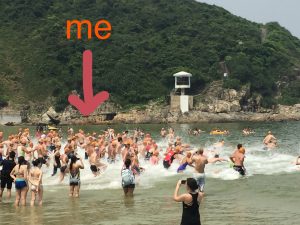 I came to Hong Kong to make a documentary film about local artists and a contemporary art fair called Art Basel Hong Kong. It’s a topic I’ve covered before (in the 2012 documentary Rising Tide: A Story of Miami Artists), and I was eager to try a new approach. The end result is a strange and wonderful film rooted in my experience and narrated in the second person. I’m still working on the documentary and having a marvelous time. Now that I’m back in the States, I’ve partnered with an incredible editor named Carlos Rivera and the movie is shaping up to be one of the most unique and personal projects I’ve ever worked on. I’m learning new things about the craft everyday – largely because I set out to make a film unlike all the previous ones I’ve made and that challenge has forced me into new creative territory.
I came to Hong Kong to make a documentary film about local artists and a contemporary art fair called Art Basel Hong Kong. It’s a topic I’ve covered before (in the 2012 documentary Rising Tide: A Story of Miami Artists), and I was eager to try a new approach. The end result is a strange and wonderful film rooted in my experience and narrated in the second person. I’m still working on the documentary and having a marvelous time. Now that I’m back in the States, I’ve partnered with an incredible editor named Carlos Rivera and the movie is shaping up to be one of the most unique and personal projects I’ve ever worked on. I’m learning new things about the craft everyday – largely because I set out to make a film unlike all the previous ones I’ve made and that challenge has forced me into new creative territory.
3. How did you originally hear about the Fulbright Program?
Before I went to Fordham for grad school, I understood Fulbright to be an exclusive program for Ivy Leaguers. Far, out of reach and super exclusive. My undergrad was an enormous state university and I got a little lost in the shuffle. If there were seminars or orientations, I completely missed them. So it was a decade later when I stumbled into a Fulbright Orientation event at Fordham University, completely by chance. It seemed like an incredible opportunity, and I decided on the spot that I wanted to participate in the program.
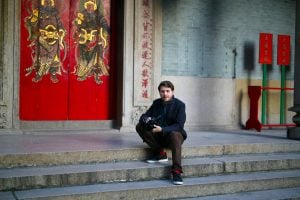
Andrew Hevia, 2015-2016, Hong Kong (Photo by Robert Scherle)
4. Why should more applicants in the creative and performing arts apply to Fulbright?
It’s a 10-month stipend that sends you out into the world and allows you the freedom to create art. Literally every single artist I know or have met would have benefited from an opportunity like this. Plus, creative work is best done outside of your comfort zone. The entire experience of living abroad is about being outside your comfort zone.
5. Do you have any tips for applicants in film or film studies to the Fulbright Program?
Not only is cinema an incredible way to explore a local culture, it’s a fantastic way to share experiences across cultures. Everyone likes movies.
On top of that, filmmaking is a super power. Because I was making a documentary, I got invited to events and got special access to people I would never have had as a tourist. It gave me credibility in the eyes of strangers and it helped open my eyes to the world around me. More filmmakers should apply (documentary and fiction and experimental) and I think everyone would be delighted with the results.
Do I have specific tips? Sure. Before you apply, prove you can make a movie with the resources you have available. This is key to both Fulbright and your life as a filmmaker. Have a camera and a laptop. Know how to edit. As long as you can be a self-contained unit, you’re unstoppable. Yes, there’s a baseline cost to this, but those skills are marketable and the camera/laptop combo are the tools of the trade. For nearly a decade before Fulbright, I made my living working with that camera and that laptop. They aren’t expenses – they’re investments, provided you use them correctly. Or find me on Twitter @andrew_hevia and ask me specific questions.
6. What are you currently working on and what’s on the professional horizon for you?
I’ve got a number of projects in motion, including a new fiction film set in Hong Kong. It was just announced in the Hollywood Reporter, actually. (http://www.hollywoodreporter.com/news/moonlight-producer-planning-hong-kong-set-thriller-985958)
That film came about when I met a commercial and film director named Joshua Wong. He was quite literally the second person I met in Hong Kong, at a coffee shop next door to my tiny apartment. Josh has a creative studio in Hong Kong called the Laundromatte, and he and his partner Ernest offered me desk space while I was editing my documentary. Josh and I got in the habit of taking lunch together and slowly developed the idea for this film. It’s a mystery thriller about a British born Chinese photographer who travels to Hong Kong and accidentally photographs a crime in progress. Josh is really an incredible talent and the film is going to be a tense and visual exploration of one of the most dynamic cities on the planet.
Editor’s note: Portions of this interview were also given by the author to Fordham Magazine and appear online in an article published here.

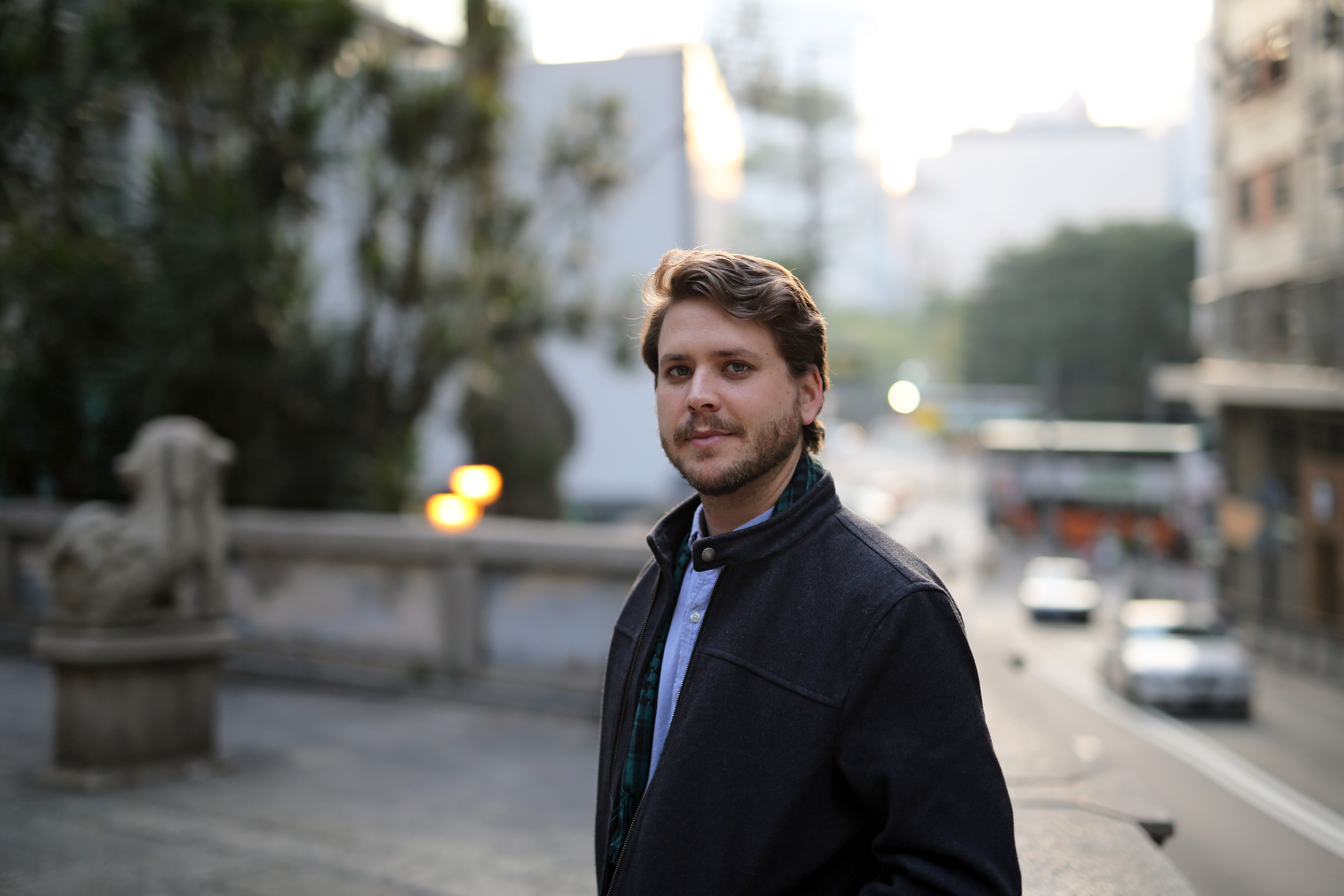
2 Comments
very inspiring 🙂
thank you for sharing knowlegable information with us